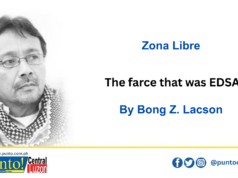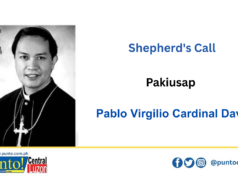TEACHER’S HEROISM Day, January 30, has served in the past few years as an opening event in the annual celebration of Kaganapan cityhood charter celebration in the City of San Fernando.
A most auspicious event to start the coming-to- fulfilment – that’s what “kaganapan” precisely means in Pilipino — of whatever promised greatness for this capital city and its people.
But for a select few in-the-know at city hall itself, who is even remotely aware of the meaning of that day? Of what heroic act the teachers accomplished and are now celebrated for. Or, who these teachers even were.
The significance of the event not only to the city but to the country itself prodded me to re-issue this piece published here some years back.
The “Rape of Democracy” it was called by the mosquito press – the intrepid underground publications and tabloids of the time – as it merited little if any play-up in the mainstream Marcosian media, especially in its flagship broadsheet Daily Express which was derisively punned and fittingly panned as the Daily Suppress.
So, the electorate was allowed to vote freely in the local elections of 1980. But the manual counting and canvassing of their votes was an altogether different matter.
Sensing imminent wholesale defeat for the administration’s Kilusang Bagong Lipunan (KBL) candidates – yes wholesale, as bloc voting was prescribed by the Commission on Elections itself – even at the onset of the counting, operatives of the party in-power let loose their armed goons upon the polling precincts, taking the ballot boxes and all election materials, and – when they resisted – the teachers themselves.
Fading memory now notwithstanding, it was in the small barangay of Malpitic that the news of the “snatching of ballots” and “kidnapping of teachers” first came out, and spread fast across town with reports of similar incidents occurring in practically all barangays of San Fernando.
Herded at the municipal hall and under pain of death, the teachers were forced to play the charade of vote-canvassing – first reading “KBL,” then tallying the vote in the designated KBL box of the canvass sheet, regardless of what was written on the ballot.
No mere urban legend were the stories of the teachers – in fits of nervousness and intense stress – peeing in their skirts and, perhaps on impulse of courageous defiance, reduced to stuttering “LBK,” “KLB,” and “BLK,” everything but the acronym they were forced to utter.
Truly, a stuff of legend though was the fearless stand of the teachers led by Madam Tess Tablante to publicly expose the ordeal they went through that forced the regime to nullify the election results – acknowledging that the teachers were “threatened and coerced into making spurious election returns without regard to the genuine ballots in the ballot boxes” – and unseated the Comelec-proclaimed winner, re-electionist Armando P. Biliwang.
In the interregnum ensued an unprecedented rule of succession with a Philippine Constabulary officer, Col. Amante S. Bueno, deputy commander for administration of the 3rd Regional PC Zone at Camp Olivas, taking over as OIC-Mayor, and succeeded by lawyer Vic Macalino, on the recommendation of the Honorable Estelito P. Mendoza, governor of Pampanga, secretary of justice, solicitor-general, among other titles.
The political impasse coming to an end with the special mayoralty election in 1983 won by Virgilio “Baby” Sanchez, who was Biliwang’s predecessor. That this: the teachers defending – with their very lives if needed – the sanctity of the vote at the height of the dictatorship when elections were a mockery of democracy, was damned heroic.
That in all of the Philippines where electoral terrorism was wanton practice, such heroism had to happen in San Fernando could only speak of redoubtable courage, a testimony to true grit of the local teachers.
January 30, 1980 in San Fernando is no mere footnote but a shining milestone in the history of the Filipino struggle for democracy, coming as it is full six years before the EDSA People Power Revolt that finally ousted the dictatorship.
More than just being opening event to the annual celebration of Kaganapan, Teachers’ Heroism Day needs to be memorialized – in stone, as in a monument to the courageous teachers, most fittingly at the Heroes Park; in book form, as in an oral history of the personal accounts of the teachers themselves.
In this era of fake news and forged histories, that task for the city government is as much incumbent as urgent. As much for the teachers, as for patrimony of the Fernandino.
So, what’s keeping the city from doing it?





